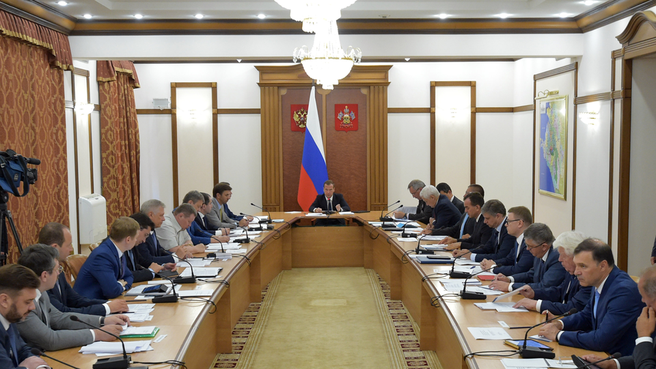Agenda: organisation of the commission’s activities, import substitution in agriculture.
From Dmitry Medvedev’s opening remarks:
Our country has been awarded the right to host the WorldSkills-2019 competition. Kazan beat out such worthy contenders as Paris and the Belgian city of Charleroi. Tatarstan knows how to host events such as this, and I have no doubt that everything will be done very well.
Today, we are holding the first meeting of the Government Commission on import substitution. The commission's task is to create appropriate conditions for Russian producers in those industries and sectors of the economy that remain highly dependent on imports. These include the machine tool industry and most sub-sectors of the engineering industry, radio-electronics, the light industry, pharmaceuticals and the medical industry.
Our goal is not to substitute imported goods at any cost, especially for mediocre goods made in Russia. This is economically inexpedient and simply impossible. We are talking about helping Russian companies produce world-class, modern, high-quality and high-demand goods, which would be able to compete not only on our domestic market, but also internationally.
In those sectors where analogues of imported goods are produced, we will need to upgrade the existing enterprises and increase their output. If no such analogues exist but these products are required for normal work, their production has to be organised domestically in the shortest possible timeframe and based on our technology where possible. Such import substitution makes obvious sense, but of course, in some cases, foreign technology will have to be used.
Two activity areas will be organised within the commission: one on civil industry, and the second, on the defence industry.
The work of the new structure should be organised in two areas. First is the coordination of the activities of the federal executive bodies, regional authorities, state companies, companies with partial state ownership and development institutions on import substitution.
The second task: from 10 January 2016, the Commission will consider issues related to public procurement as part of specific investment projects. We are investing significant public resources in them, including the resources of the National Welfare Fund and Vnesheconombank. We will encourage the participants of these investment projects, including state companies and partially state-owned companies, to procure the necessary goods and services, primarily from Russian suppliers.
The very first decisions on the development of import substitution were made in agriculture and the special plan to promote import substitution in agriculture was approved earlier than in other sectors. We adjusted the state programme for the period until 2020, which was tailored to these goals. Additional funding has been allocated from the federal budget. Close to 240 billion roubles will be allocated to support agriculture this year alone. Next year and in the next period, we are planning to sustain this level of support.
A list of investment projects to promote import-substitution in agriculture was approved in March of this year. There are about 460 such projects. The level of investment is also significant: 265 billion roubles.
The agricultural sector has been also significantly boosted as a result of the counter sanctions on food imports. These include a fairly wide range of agricultural products. Recently, we extended these counter sanctions for another year. Farmers have benefited as a result, and our goal is not to stop at it, especially considering that, as important as they are, sanctions will not last forever. Both the Government and farmers need to take advantage of this period.
We have not succeeded yet in fully substituting imports. For some products it will take several years. Still, there is no shortage of meat, milk or fruit and vegetables, and at least this year the situation is absolutely stable.









